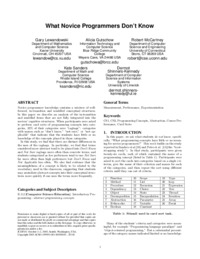Novice programmer knowledge contains a mixture of well-formed, in-transition and muddled conceptual structures. In this paper we describe an analysis of the in-transition and muddled items that are not fully integrated into the novices' cognitive structures. When participants were asked to perform card sorts of programming concepts into categories, 23% of their categories were "ragbags": categories with names such as "don't know," "not sure," or "not applicable"'' that indicate that the students have little or no knowledge of the concepts placed in those categories.In this study, we find that there are distinct differences in the uses of the ragbags. In particular, we find that terms considered more abstract tend to be placed into Don't Know and Not Sure ragbags more often than concrete terms; and students categorized as low performers tend to use Not Sure far more often than high performers but Don't Know and Not Applicable less often. We also find evidence that the meaningfulness of a concept is likely to be related to the vocabulary used in the classroom, suggesting that students may assimilate abstract concepts into their conceptual structures more quickly if one uses the terms more frequently.
Von Gary Lewandowski, Alicia Gutschow, Robert McCartney, Kate Sanders, Dermot Shinners-Kennedy im Konferenz-Band ICER 2005 im Text What novice programmers don't know (2005) 
 Diese Seite wurde seit 5 Jahren inhaltlich nicht mehr aktualisiert.
Unter Umständen ist sie nicht mehr aktuell.
Diese Seite wurde seit 5 Jahren inhaltlich nicht mehr aktualisiert.
Unter Umständen ist sie nicht mehr aktuell.
 Beats Biblionetz - Texte
Beats Biblionetz - Texte 
 Diese Seite wurde seit 5 Jahren inhaltlich nicht mehr aktualisiert.
Unter Umständen ist sie nicht mehr aktuell.
Diese Seite wurde seit 5 Jahren inhaltlich nicht mehr aktualisiert.
Unter Umständen ist sie nicht mehr aktuell.
 Zusammenfassungen
Zusammenfassungen  Dieses Konferenz-Paper erwähnt ...
Dieses Konferenz-Paper erwähnt ... Anderswo finden
Anderswo finden  Volltext dieses Dokuments
Volltext dieses Dokuments  Anderswo suchen
Anderswo suchen 
 Beat und dieses Konferenz-Paper
Beat und dieses Konferenz-Paper Biblionetz-History
Biblionetz-History 
 QR-Code dieser Seite
QR-Code dieser Seite